1. Metallurgical properties of materials
Longitudinal submerged arc welded pipes are produced from steel plates, while
spiral welded pipes are produced from hot rolled coils. The rolling process of the hot-rolled strip mill has a series of advantages and can obtain the metallurgical process for producing high-quality pipeline steel. For example, a water cooling system is installed on the output gantry to accelerate cooling, which allows the use of low alloy composition to achieve special strength grades and low-temperature toughness, thereby improving the weldability of steel. But this system does not exist in the steel plate production plant. Coils tend to have a lower alloy content (carbon equivalent) than similar grades of steel, which also improves the weldability of spiral welded pipe.
What needs to be explained is that since the rolling direction of the spiral welded pipe is not perpendicular to the axis of the steel pipe (the clamping solution depends on the helix angle of the steel pipe), and the rolling direction of the steel plate of the straight seam steel pipe is perpendicular to the axis of the steel pipe, therefore, the spiral steel pipe. The crack resistance of welded pipe material is better than that of straight seam steel pipe.
2. Welding process
In terms of the welding process, the welding method of spiral welded pipe and straight seam steel pipe is the same, but the straight seam welded pipe will inevitably have a lot of T-shaped welds, so the probability of welding defects is also greatly increased, and the welding residue at the T-shaped welds The stress is large, and the weld metal is often in a three-dimensional stress state, which increases the possibility of cracks.
Moreover, according to the technical regulations of submerged arc welding, each weld should have an arc starting point and an arc extinguishing point, but each straight seam welded pipe cannot meet this condition when welding a circular seam, so there may be more welding defects.
3. Strength characteristics
When the pipe is subjected to internal pressure, two main stresses are usually generated on the pipe wall, namely radial stress δY and axial stress δX. The resultant stress at the weld δ=δY(l/4sin2α+cos2α) 1/2, where α is the helix angle of the weld of the spiral welded pipe.
The helix angle of the spiral welded pipe weld is generally 50-75 degrees, so the composite stress at the spiral weld is 60-85% of the principal stress of the straight seam welded pipe. Under the same working pressure, the wall thickness of the spiral welded pipe with the same pipe diameter can be reduced to that of the straight seam welded pipe. According to the above characteristics, it can be seen that:
A. When the spiral welded pipe is blasted, because the normal stress and the synthetic stress on the weld are relatively small, the blasting opening generally does not originate from the spiral weld, and its safety is higher than that of the straight seam welded pipe.
B. When there are parallel defects near the spiral weld, the risk of expansion of the spiral weld is not as large as that of the straight weld because the stress on the spiral weld is small.
C. Since the radial stress is the maximum stress existing on the steel pipe, the weld bears the maximum load when it is in the direction of the vertical stress. That is, the straight seam bears the largest load, the circumferential weld bears the smallest load, and the spiral seam is in between.
4. Static pressure burst strength
Through relevant comparative tests, it is verified that the yield pressure of the spiral welded pipe and the longitudinal seam welded pipe are consistent with the measured and theoretical values of the burst pressure, and the deviation is close. But whether it is yield pressure or burst pressure, the spiral welded pipe is lower than the straight seam welded pipe. The blasting test also shows that the circumferential deformation rate of the spiral welded pipe blasting opening is significantly greater than that of the straight seam welded pipe. This proves that the plastic deformation ability of the spiral welded pipe is better than that of the straight seam welded pipe, and the blasting opening is generally limited to one pitch, which is due to the strong restraint effect of the spiral weld on the expansion of the crack.
5. Toughness and fatigue strength
The trend of pipeline development is large diameter and high strength. With the increase of the diameter of the steel pipe and the improvement of the steel grade used, the tendency of the ductile fracture tip to expand steadily is greater. According to tests conducted by relevant research institutions in the United States, although spiral welded pipes and longitudinal welded pipes are of the same level, spiral welded pipes have higher impact toughness.
Due to the change in the transmission pipeline, in the actual operation process, the steel pipe < is subjected to random alternating loads. Understanding the low cycle fatigue strength of steel pipes is of great significance for judging the service life of pipelines.
According to the measurement results, the fatigue strength of the spiral welded pipe is the same as that of the seamless pipe and the resistance welded pipe, and the test data is distributed in the same area as the seamless pipe and the resistance pipe and is higher than that of the general submerged arc welded pipe.
6. Field Solderability
On-site weldability is mainly determined by the material of the steel pipe and the tolerance of the port fit size. Considering the requirements of steel pipe installation and construction, the continuity of steel pipe processing and the consistency of geometric dimensions are particularly important. The production of spiral welded pipe is a stable continuous process under the same working conditions: while the production process of longitudinal welded pipe is segmented, including whole plate/press head/pre-rolling/spot welding/welding/finishing/grouping, etc. Multi-process process. This is an important feature that distinguishes the production of spiral welded pipes from the production of straight seam welded pipes. The stable production conditions are very convenient for the control of welding quality and the guarantee of geometric dimensions. Due to the regular shape of the spiral welded pipe and the uniform distribution of welds, compared with the straight seam welded pipe, the spiral steel pipe has a very good nozzle ellipticity and end face verticality, which ensures the alignment accuracy of the on-site steel pipe welding alignment.
7. Influence on the flow characteristics of the conveying medium
The pressure drop in the delivery pipeline is proportional to the length of the pipe, fluid viscosity coefficient, fluid velocity, and fluid resistance coefficient, and inversely proportional to the inner diameter of the pipe. The fluid resistance coefficient is not only related to the Reynolds number but also related to the roughness of the inner wall surface of the pipe. It has been determined that the influence of the roughness of the inner wall surface of the pipe is ten times greater than that of the area of local bulges (such as spiral welds or longitudinal welds, even including inner circular welds).
8. Production and management
The production of spiral welded steel pipe can reflect the advantages of high quality and high efficiency. The production capacity of one spiral welded pipe unit is equivalent to 5-8 sets of straight seam welded pipe equipment. How to make the production lines of multiple coiled pipe equipment meet the same production standard, that is, produce according to the unified production process specification and quality assurance system to meet the welding quality Required and piping fabrication grades would be a lot of work. Multi-head production has the potential to increase the amount of engineering management and quality supervision. Multiple straight seam coiling units and corresponding welding equipment, the differences in the operating skills, quality awareness, distribution points, and control procedures of the operators will bring many difficulties in production management, planning progress, inspection and acceptance, delivery coordination, etc., It is very easy to confuse management and coordination and quality evasion of manufacturers and construction units.
9. Quality Assurance
According to the provisions of the spiral welded pipe production standard, the main inspection/control items of the spiral welded steel pipe include:
Dimensions: outer diameter of steel pipe, wall thickness, ellipticity, curvature, the verticality of the pipe end
Length appearance quality: weld reinforcement, misalignment, steel pipe surface, delamination, inclusions, weld defect judgment
chemical composition
Welded joint tensile test
Hydrostatic pressure test
Acid etch inspection
Non-destructive testing
However, there is no corresponding production standard for straight seam welded pipes. Generally, the spiral welded pipe unit adopts the online continuous inspection method to ensure the welding quality of the weld seam, which is another important feature that distinguishes the production of spiral welded pipe from the production of straight seam welded pipe. Continuous inspection is beneficial to the monitoring of welding defects, the stability of welding quality, and the guarantee of welding grade. Due to the limitations of the production process, it is extremely difficult to achieve continuous and uninterrupted inspection of longitudinal seam welded pipes. This will increase the probability of welding hidden dangers and quality problems, and even affect the overall reliability of pipeline operations in the future.
10. Production qualification
Manufacturers of spiral welded pipes should hold industrial product production licenses issued by the state. The license system requires that manufacturers of spiral welded pipes should first pass the examination and assessment of the authoritative inspection agency recognized by the state, have corresponding production methods and inspection equipment, and have a good and effective quality assurance system. The products should meet the requirements of the national standard grade and quality specifications, after confirmation by the National Industrial Product Production License Office. Therefore, spiral welded pipe manufacturers have a relatively complete quality assurance system and quality control operating procedures. Longitudinal welded pipe manufacturers do not require industrial product production licenses.
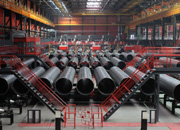 Threeway Steel is known as a professional supplier engaged in manufacturing and distributing a wide range of steel pipe, and our headquarter located the central part of China – Hunan and six associated factories throughout China.
Threeway Steel is known as a professional supplier engaged in manufacturing and distributing a wide range of steel pipe, and our headquarter located the central part of China – Hunan and six associated factories throughout China.
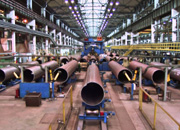 Threeway Steel is known as a professional supplier engaged in designing, manufacturing and distribution of a wide range of steel products with the headquarter located the central part of China – Hunan and six associated factories throughout China.
Threeway Steel is known as a professional supplier engaged in designing, manufacturing and distribution of a wide range of steel products with the headquarter located the central part of China – Hunan and six associated factories throughout China.
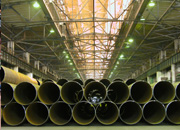 Threeway Steel is known as a professional supplier engaged in designing, manufacturing and distribution of a wide range of steel products with the headquarter located the central part of China – Hunan and six associated factories throughout China.
Threeway Steel is known as a professional supplier engaged in designing, manufacturing and distribution of a wide range of steel products with the headquarter located the central part of China – Hunan and six associated factories throughout China.
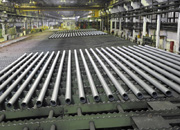 Threeway Steel is known as a professional supplier engaged in designing, manufacturing and distribution of a wide range of steel products with the headquarter located the central part of China – Hunan and six associated factories throughout China.
Threeway Steel is known as a professional supplier engaged in designing, manufacturing and distribution of a wide range of steel products with the headquarter located the central part of China – Hunan and six associated factories throughout China.
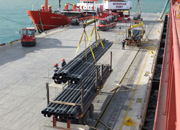 Threeway Steel is known as a professional supplier engaged in designing, manufacturing and distribution of a wide range of steel products with the headquarter located the central part of China – Hunan and six associated factories throughout China.
Threeway Steel is known as a professional supplier engaged in designing, manufacturing and distribution of a wide range of steel products with the headquarter located the central part of China – Hunan and six associated factories throughout China.

